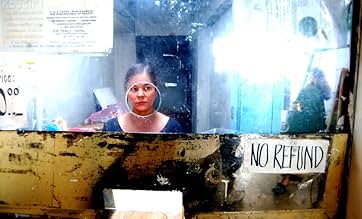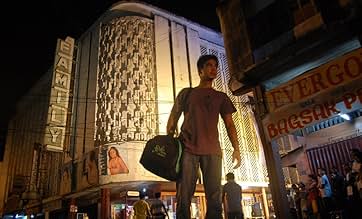IMDb-BEWERTUNG
6,1/10
2011
IHRE BEWERTUNG
Füge eine Handlung in deiner Sprache hinzuThe Pineda family struggles with bigamy, unwanted pregnancy, possible incest, and skin irritations in a dilapidated movie theater.The Pineda family struggles with bigamy, unwanted pregnancy, possible incest, and skin irritations in a dilapidated movie theater.The Pineda family struggles with bigamy, unwanted pregnancy, possible incest, and skin irritations in a dilapidated movie theater.
- Auszeichnungen
- 9 Gewinne & 15 Nominierungen insgesamt
Kristoffer King
- Ronald
- (as Kristofer King)
Dido de la Paz
- Atty. Quintana
- (as Dido Dela Paz)
Buddy Caramat
- Tonette
- (as Buddy Salvador Caramat)
Aaron Rivera
- Ricky
- (as Aaron Christian Rivera)
Empfohlene Bewertungen
Even before watching our very own semi-controversial finalist in the Cannes de Festival this year, I knew that I would love Brillante Mendoza's "Serbis." Not only because two of my friends are in the production team, but this film strikes a familiar chord in my heart because I know personally the venue and the local color of the story where the story of the film takes place. I grew up in Pampanga and saw many films in majority of the theaters in Pampanga. During the lahar era, my sister and I stayed and lived in our photography studio, which was just beside San Fernando's best theater then. That time, I was inside that theater almost every day, watching the same film of the week again and again. If that does not conjure much bias for this film, maybe this one will: I personally experienced being almost sexually harassed in the Family Theater, the very same one featured in the film "Serbis." Now that's enough neo-realism for you. Hahaha!
I can understand why many people dislike "Serbis"--it's too raw, uninhibited, and bleak. Foreigners would be turned off by the disgusting display of sexual scenes and the popping of the boil from an actor's buttocks and the deafening and unrefined sound quality. And Filipinos would also be repulsed by the "lack of story" and the absence of subtitles while the actors freely converse in Kapampangan and Ilocano.
I am lucky enough to have an Ilocano beside me in the theater, translating the Ilocano dialogue. Of course, I was delighted to hear Kapampangan being spoken so lavishly and frequently in the entire course of the story. It felt so much like home to me. The sound and sight of Pampanga in the film are startlingly genuine. I shivered at the sight of familiar places. I marveled at the uncanny natural feel of the setting. The theater is alive.
We witness how the camera leads us to follow the main characters, as it snakes in and out of every room and shamelessly presents to us its ugliness and grittiness. The theater is a character itself--it has its own personality and even moral obligation to the psyche of every single character living or simply loitering in its premises. The members of the audience become part of the story as we spy on the characters' regrettable lives. The characters hang on to the theater as their refuge to the wretchedness of their own problems. We get to see a thin slice of their lives, from morning to night, which is more than enough to establish the story and make the audience draw out their own inferences as to how the story would, not end, but continue even after the credits start to roll.
That's probably what many viewers missed after seeing and dissing the movie with raised eyebrows and shoulders. The film managed to make them feel estranged because they are not familiar with such abnormalities or disgusted because the film does not apologize for its harsh depiction of the reality of "serbis" not only inside the film theater but also of the entire local film industry itself. It is quite apparent that the entire film is both homage to and critique on the Philippine cinema.
The most striking realization I had a few minutes after seeing the film is that despite the revolting scenes and appalling images bombarded to the audience in the majority of the screening time, there are also bits of images of optimism for the future of the characters and the theater itself: the walls are being repainted, the head of the family sits in front of the ticketing booth (suggesting taking more control of the cinema), and the troubled son starts his own journey to find himself even against the religious parade and the anonymous throng opposite his direction. In the words of Sam Cooke: A change is gonna come. I hope that Brillante's brilliant film will also be the impetus of such a thing in the Philippine cinematic history.
I can understand why many people dislike "Serbis"--it's too raw, uninhibited, and bleak. Foreigners would be turned off by the disgusting display of sexual scenes and the popping of the boil from an actor's buttocks and the deafening and unrefined sound quality. And Filipinos would also be repulsed by the "lack of story" and the absence of subtitles while the actors freely converse in Kapampangan and Ilocano.
I am lucky enough to have an Ilocano beside me in the theater, translating the Ilocano dialogue. Of course, I was delighted to hear Kapampangan being spoken so lavishly and frequently in the entire course of the story. It felt so much like home to me. The sound and sight of Pampanga in the film are startlingly genuine. I shivered at the sight of familiar places. I marveled at the uncanny natural feel of the setting. The theater is alive.
We witness how the camera leads us to follow the main characters, as it snakes in and out of every room and shamelessly presents to us its ugliness and grittiness. The theater is a character itself--it has its own personality and even moral obligation to the psyche of every single character living or simply loitering in its premises. The members of the audience become part of the story as we spy on the characters' regrettable lives. The characters hang on to the theater as their refuge to the wretchedness of their own problems. We get to see a thin slice of their lives, from morning to night, which is more than enough to establish the story and make the audience draw out their own inferences as to how the story would, not end, but continue even after the credits start to roll.
That's probably what many viewers missed after seeing and dissing the movie with raised eyebrows and shoulders. The film managed to make them feel estranged because they are not familiar with such abnormalities or disgusted because the film does not apologize for its harsh depiction of the reality of "serbis" not only inside the film theater but also of the entire local film industry itself. It is quite apparent that the entire film is both homage to and critique on the Philippine cinema.
The most striking realization I had a few minutes after seeing the film is that despite the revolting scenes and appalling images bombarded to the audience in the majority of the screening time, there are also bits of images of optimism for the future of the characters and the theater itself: the walls are being repainted, the head of the family sits in front of the ticketing booth (suggesting taking more control of the cinema), and the troubled son starts his own journey to find himself even against the religious parade and the anonymous throng opposite his direction. In the words of Sam Cooke: A change is gonna come. I hope that Brillante's brilliant film will also be the impetus of such a thing in the Philippine cinematic history.
This is a film that has no cohesive narrative, really, it's more of a series of snapshots, if you will, of the lives that revolve on a ramshackle movie theater that can be considered as the star of this film, like a living breathing creature that it is, all with its operators and the patrons that frequent it, a place that had seen better days which nobody seems to clearly remember. Actually, only Nanay Flor, (played by Gina Pareño, an actress that in her heydays was quite a vamp) who's an embattled matriarch undergoing divorce proceedings with the unpresent patriarch, still manages to be unperturbed, feathers unruffled (a bravura performance), while others in the building just soldier on and are left just going through the motions. Despite the progress of technology where people can easily find pornographic content on the Internet during the decade of the noughts when this film is set, it still remains but a stubborn bastion of sleaze with its sieve-like fortifications, everybody or anything can get in and out of it in the middle of a noisy city. Noise pollution be damned (at least I could just read the subtitles like other non-Filipino speakers). Such cacophony of sounds, though the unacquainted might find that to be a bit overwhelming, has a higher purpose and it doesn't even matter much whether that was coincidental or contrived. So it is best tho have that immersive mindset as one watches this.
Living in the same country where this film is set, I'm one of those people (though definitely not well-off) fortunate enough to have had my first experience watching cinema alone in my mid-teens in one of those up-scale mall multiplexes, and still does so occassionally to this day, which at the time I'm writing this, that viewing experience is in itself in a state of quandary as streaming services looms to replace the film viewing habits of people globally. Though cannot be considered that bad but it's also not that good either, imho, because I find theaters have that certain charm, and though at times they have their own fair share of annoying co-patrons to deal with amongst other things, the overall experience tend to be on the kinder side.
An evocation of such nostalgia brings to mind the films like Tsai Ming Liang's Goodbye, Dragon Inn or Giuseppe Tornatore's Oscar-winner Cinema Paradiso, their love-letter to cinema both set in the theater space which does not shy away from detailing the seamier side of those experiences. But what we witness in Brilliante Mendoza's socio-realist masterpiece is that there is no energy to spare when it comes to sharing the mawkishness that that the Family Theater matron in the film have manifested. He instead went in and goes straight for the jugular, hastily sending subtlety to vacation to showcase the yuck factor in these kinds of places instead. And one just need and look at the film titles on offer that the theater exhibits. The poor uncouth masses subjected to the indignities of having to endure such filthy places just to ply their wares, in a place where the lower class people's only form of sporting entertainment are catered by these establishments, especially during the pre-Internet era. But a welcome escapism from such bleak narrative was the goat scene which is, like, the best live-action animal cameo I've seen done in the whole of world cinema ever (G.O.A.T., right?), even beats the rooster/chicken chase in Fernando Meirelles' City of God. The gracefulness of that animal as it scampered down that staircase centerpiece was just heavenly hilarious. Unfortunately, that is the only elegant treat in store for this film.
But as for Brilliante Mendoza's reputation as a filmmaker, I feel this has definitely cemented his place as a significant voice in the Philippine film industry. Though I was initially disappointed, having watched Kinatay before this, a film that I felt that something was quite lacking as I watched that one in full, I was left kind of dumbfounded as to what the hoopla surrounded Mendoza receiving that directorial accolade at Cannes. But only after watching this film that immediately preceded it, the more clearer it became to me what reflected their decision to give him those honors, and I couldn't agree more now. The dilapidated chic aesthetic of those two films, I dare say, go well together and should be seen as a double-bill feature instead because the director encapsulated all that needs to said without saying much with those two films he made back-to-back, providing the best way of presenting people who the people living in the Philippines really are, which is a quite very courageous statement.
So this film definitely functions as a quasi-document to express the lament of the silenced masses who have just resigned to their predicament, people that have no other way to voice out their despair, those of whom who don't have any more tears left to shed. Mendoza and his crew has facilitated that for them. So even if the passage of time inevitably replace of those dilapidated structures, at least the likes of me, we have this. Numquam obliviscar.
Rating: (A beta-plus).
Living in the same country where this film is set, I'm one of those people (though definitely not well-off) fortunate enough to have had my first experience watching cinema alone in my mid-teens in one of those up-scale mall multiplexes, and still does so occassionally to this day, which at the time I'm writing this, that viewing experience is in itself in a state of quandary as streaming services looms to replace the film viewing habits of people globally. Though cannot be considered that bad but it's also not that good either, imho, because I find theaters have that certain charm, and though at times they have their own fair share of annoying co-patrons to deal with amongst other things, the overall experience tend to be on the kinder side.
An evocation of such nostalgia brings to mind the films like Tsai Ming Liang's Goodbye, Dragon Inn or Giuseppe Tornatore's Oscar-winner Cinema Paradiso, their love-letter to cinema both set in the theater space which does not shy away from detailing the seamier side of those experiences. But what we witness in Brilliante Mendoza's socio-realist masterpiece is that there is no energy to spare when it comes to sharing the mawkishness that that the Family Theater matron in the film have manifested. He instead went in and goes straight for the jugular, hastily sending subtlety to vacation to showcase the yuck factor in these kinds of places instead. And one just need and look at the film titles on offer that the theater exhibits. The poor uncouth masses subjected to the indignities of having to endure such filthy places just to ply their wares, in a place where the lower class people's only form of sporting entertainment are catered by these establishments, especially during the pre-Internet era. But a welcome escapism from such bleak narrative was the goat scene which is, like, the best live-action animal cameo I've seen done in the whole of world cinema ever (G.O.A.T., right?), even beats the rooster/chicken chase in Fernando Meirelles' City of God. The gracefulness of that animal as it scampered down that staircase centerpiece was just heavenly hilarious. Unfortunately, that is the only elegant treat in store for this film.
But as for Brilliante Mendoza's reputation as a filmmaker, I feel this has definitely cemented his place as a significant voice in the Philippine film industry. Though I was initially disappointed, having watched Kinatay before this, a film that I felt that something was quite lacking as I watched that one in full, I was left kind of dumbfounded as to what the hoopla surrounded Mendoza receiving that directorial accolade at Cannes. But only after watching this film that immediately preceded it, the more clearer it became to me what reflected their decision to give him those honors, and I couldn't agree more now. The dilapidated chic aesthetic of those two films, I dare say, go well together and should be seen as a double-bill feature instead because the director encapsulated all that needs to said without saying much with those two films he made back-to-back, providing the best way of presenting people who the people living in the Philippines really are, which is a quite very courageous statement.
So this film definitely functions as a quasi-document to express the lament of the silenced masses who have just resigned to their predicament, people that have no other way to voice out their despair, those of whom who don't have any more tears left to shed. Mendoza and his crew has facilitated that for them. So even if the passage of time inevitably replace of those dilapidated structures, at least the likes of me, we have this. Numquam obliviscar.
Rating: (A beta-plus).
I watched this movie with my filipino wife, she knew a many actors from there. I like the older pinoy movies, however they are mostly depressive and about hard life, but probably since this is not so old movie, it was not so dark. With a little filipinou humour style, i liked it.
"I love you..."
The opening sequence of Brillante Mendoza's Serbis sets it all: the sex, the troubles, the creepy old cinema. And soon Mendoza will pour in more of these pretty dirty stuff and guide us to an ending that doesn't seem like a real conclusion. We feel as if we just entered a tunnel of filth and a cold shower would help.
Serbis is about a family living in an aging movie house. This cinema is their living and the family will bend their backs just to save it. In the middle, each member encounters conflicts that will test them. The grandmother hopes for a chance of winning a case against her own husband, the sons fight over a shirt, a female worker discovers her pregnancy, the mother trying to control everything and the youngest child witnessing it all. Everyone's got problems and Serbis tells us how they solved it in their own ways. In short, there is no plot... just conflicts and characters to be explored.
This Palme d'Or nominee is perhaps one of the darkest Filipino films ever made. Aside from that, it also showed off one of the best performances of a cast in the history of Filipino cinema. A list that boasted the sexy indie actors Gina Pareño, Jaclyn Jose, Coco Martin, Kristoffer King, Mercedes Cabral, Julio Diaz and Roxanne Jordan will really make Filipinos want to see it. What's most noteworthy is the camera-work. Serbis, along with 2007's Tirador, has Brillante Mendoza's most stunning imagery.
Serbis is a film that feels real, despite being undercooked and unfinished. Rarely do I see such a movie from my country's breezy show business. I'm very hungry for more.
The opening sequence of Brillante Mendoza's Serbis sets it all: the sex, the troubles, the creepy old cinema. And soon Mendoza will pour in more of these pretty dirty stuff and guide us to an ending that doesn't seem like a real conclusion. We feel as if we just entered a tunnel of filth and a cold shower would help.
Serbis is about a family living in an aging movie house. This cinema is their living and the family will bend their backs just to save it. In the middle, each member encounters conflicts that will test them. The grandmother hopes for a chance of winning a case against her own husband, the sons fight over a shirt, a female worker discovers her pregnancy, the mother trying to control everything and the youngest child witnessing it all. Everyone's got problems and Serbis tells us how they solved it in their own ways. In short, there is no plot... just conflicts and characters to be explored.
This Palme d'Or nominee is perhaps one of the darkest Filipino films ever made. Aside from that, it also showed off one of the best performances of a cast in the history of Filipino cinema. A list that boasted the sexy indie actors Gina Pareño, Jaclyn Jose, Coco Martin, Kristoffer King, Mercedes Cabral, Julio Diaz and Roxanne Jordan will really make Filipinos want to see it. What's most noteworthy is the camera-work. Serbis, along with 2007's Tirador, has Brillante Mendoza's most stunning imagery.
Serbis is a film that feels real, despite being undercooked and unfinished. Rarely do I see such a movie from my country's breezy show business. I'm very hungry for more.
A dilapidated Filipino movie theater is the star of this film, but it's not a dark, haunted place like the cinema of Tsai Ming-liang's austere Goodbye, Dragon Inn. Located in the city of Angeles in the Philippines, this one, only partly ironically called "Family," is active, in fact overactive, and holes in walls leave it open to invasions from goats and its lower floor is exposed to the noises of a busy street crammed with pedestrians, motorcycles, cars, and trucks at all hours.
Serbis shows heterosexual porn movies all day long while numerous gay hustlers ply their trade for the pleasure of older gay men, performing fellatio or having it performed on them in the seats and in the back of the big auditorium. "Serbis" means "service" and is the rallying cry of the gay rent boys. The theater is run by the Pineda family, who come and go, they live upstairs, they run a fast food restaurant on the ground floor, and they deal with such personal problems as bigamy, unwanted pregnancy, possible incest, and a boil on an attractive young male bum. This film, which includes clips of the porno, live sex involving the family and the in-house prostitutes, is Mendoza's seventh feature film and was an official selection of the 2008 Festival de Cannes.
Events happen on a "Wednesday (the day for the novena to the Mother of Perpetual Help) in October (month-long feast of Our Lady of the Rosary)"--I'm quoting from the distributor's material. The rather regal Nanay Flor (Gina Pareno) has filed a bigamy case against her estranged husband Tatay Edwinand goes to court to see the years-long case finally decided. Alan (Coco Martin) is a young man upstairs who paints busty nudes on the wall; he's the one who has a boil on his bum. He has sex with his girlfriend Merly (Mercedes Cabral) and has just learned to his dismay that she is pregnant. Nayda (Jacky Jose), who mans the theater while Nanay For is at court, is married but drawn to her cousin Ronald, who is also in the building. She sees to having the right movie posters up, and argues with her husband, Lando, on the phone, because Mr. El Lobo, the soft drink distributor, has to be paid. Lando (Julio Diaz) mans the little restaurant, not always successfully; a young man cheats him out of 30 pesos and he can't get it back. There is another brother, Ronald (Kristopher King). There's also a little bespectacled schoolboy, Jonas, who's good in math. The things he sees! Nanay Flor says that they had three theaters, but have had to close the other two because they weren't making money, and this one is failing.
Nanay Flor loses the case, and to her disappointment her youngest son, Jerome (Dan Alvaro) testifies against her. She is further distressed to learn that the film rentals are going up. Serbis is replete with actual details of this kind, and even shows Alan delivering reels to a bus and picking up the new ones for the week.
Excitement happens when a purse-snatcher tries to take refuge in the theater but customers, the family, and cops all chase him. The lights go on exposing the many "serbis" boys 'in flagrante.' When the thief is caught the lights go down, the film resumes, and the "serbis" boys are back to work. At another point a small white goat has escaped into the theater and appears just below the screen. Another chase. To recover from her horrible day, Nanay Flor takes a bath in the shoddy bathroom (the Gent's is flooded), grooms herself and dresses in black, and goes down to the ticket window facing out, ready for anything.
After symbolically popping his boil, Alan has impulsively packed a bag and run away. way.
Carlo Tabije and Benjamin Padero deserve notice for their set designs (the field in which Mendoza got his start); Odyssey Flores' cinematography is rough at times, but effective. The processing gives the images too edgy a look at times. The lighting isn't bad, but there is way too much street noise, and those who argue the whole production is exploitive and crude aren't far off the mark, but the depiction of a family isn't without interest, though this has none of the poetry and mood of other films about the devolution of a place.
This is as if a Third World 'telenovela,' with X-rated sex added, was all crammed into a single comprehensive 90-minute episode. It's an impressive achievement, but a little bit indigestible. Mendoza's earlier film 'Foster Child' received an ovation at the previous Cannes festival. He has produced something sui generis this time and it would appear that there is life in the Filipino film industry.
Serbis shows heterosexual porn movies all day long while numerous gay hustlers ply their trade for the pleasure of older gay men, performing fellatio or having it performed on them in the seats and in the back of the big auditorium. "Serbis" means "service" and is the rallying cry of the gay rent boys. The theater is run by the Pineda family, who come and go, they live upstairs, they run a fast food restaurant on the ground floor, and they deal with such personal problems as bigamy, unwanted pregnancy, possible incest, and a boil on an attractive young male bum. This film, which includes clips of the porno, live sex involving the family and the in-house prostitutes, is Mendoza's seventh feature film and was an official selection of the 2008 Festival de Cannes.
Events happen on a "Wednesday (the day for the novena to the Mother of Perpetual Help) in October (month-long feast of Our Lady of the Rosary)"--I'm quoting from the distributor's material. The rather regal Nanay Flor (Gina Pareno) has filed a bigamy case against her estranged husband Tatay Edwinand goes to court to see the years-long case finally decided. Alan (Coco Martin) is a young man upstairs who paints busty nudes on the wall; he's the one who has a boil on his bum. He has sex with his girlfriend Merly (Mercedes Cabral) and has just learned to his dismay that she is pregnant. Nayda (Jacky Jose), who mans the theater while Nanay For is at court, is married but drawn to her cousin Ronald, who is also in the building. She sees to having the right movie posters up, and argues with her husband, Lando, on the phone, because Mr. El Lobo, the soft drink distributor, has to be paid. Lando (Julio Diaz) mans the little restaurant, not always successfully; a young man cheats him out of 30 pesos and he can't get it back. There is another brother, Ronald (Kristopher King). There's also a little bespectacled schoolboy, Jonas, who's good in math. The things he sees! Nanay Flor says that they had three theaters, but have had to close the other two because they weren't making money, and this one is failing.
Nanay Flor loses the case, and to her disappointment her youngest son, Jerome (Dan Alvaro) testifies against her. She is further distressed to learn that the film rentals are going up. Serbis is replete with actual details of this kind, and even shows Alan delivering reels to a bus and picking up the new ones for the week.
Excitement happens when a purse-snatcher tries to take refuge in the theater but customers, the family, and cops all chase him. The lights go on exposing the many "serbis" boys 'in flagrante.' When the thief is caught the lights go down, the film resumes, and the "serbis" boys are back to work. At another point a small white goat has escaped into the theater and appears just below the screen. Another chase. To recover from her horrible day, Nanay Flor takes a bath in the shoddy bathroom (the Gent's is flooded), grooms herself and dresses in black, and goes down to the ticket window facing out, ready for anything.
After symbolically popping his boil, Alan has impulsively packed a bag and run away. way.
Carlo Tabije and Benjamin Padero deserve notice for their set designs (the field in which Mendoza got his start); Odyssey Flores' cinematography is rough at times, but effective. The processing gives the images too edgy a look at times. The lighting isn't bad, but there is way too much street noise, and those who argue the whole production is exploitive and crude aren't far off the mark, but the depiction of a family isn't without interest, though this has none of the poetry and mood of other films about the devolution of a place.
This is as if a Third World 'telenovela,' with X-rated sex added, was all crammed into a single comprehensive 90-minute episode. It's an impressive achievement, but a little bit indigestible. Mendoza's earlier film 'Foster Child' received an ovation at the previous Cannes festival. He has produced something sui generis this time and it would appear that there is life in the Filipino film industry.
Wusstest du schon
- WissenswertesDirector Brillante Mendoza revealed that the sex scene between Coco Martin and Mercedes Cabral was simulated. "It was assumed by everyone that in the sex scene there was real penetration. The actors knew how I work, and if they were on a different level of their profession, they probably would have had real sex. But since this was the girl's first film and she's from a conservative family, she had done enough, so there is no penetration. But I wanted people to believe there was actual sexual intercourse, and it was so realistic that people believe that's what happened," he explained.
- Zitate
Nanay Flor: How could you let this idiot impregnate you?
- VerbindungenFeatured in Logos aus der ganzen Welt: Philippines (2016)
Top-Auswahl
Melde dich zum Bewerten an und greife auf die Watchlist für personalisierte Empfehlungen zu.
- How long is Service?Powered by Alexa
Details
- Erscheinungsdatum
- Herkunftsländer
- Offizieller Standort
- Sprachen
- Auch bekannt als
- Service
- Drehorte
- Produktionsfirmen
- Weitere beteiligte Unternehmen bei IMDbPro anzeigen
Box Office
- Bruttoertrag in den USA und Kanada
- 64.536 $
- Eröffnungswochenende in den USA und in Kanada
- 12.824 $
- 1. Feb. 2009
- Weltweiter Bruttoertrag
- 155.156 $
Zu dieser Seite beitragen
Bearbeitung vorschlagen oder fehlenden Inhalt hinzufügen































